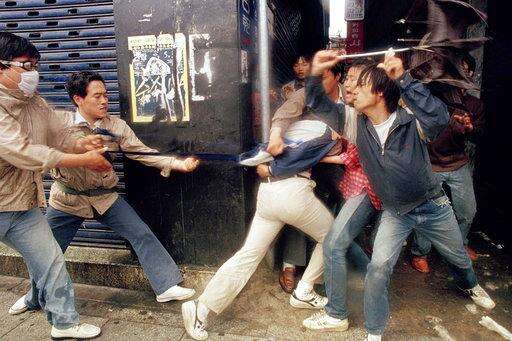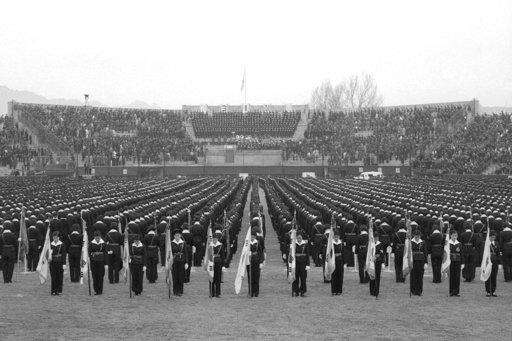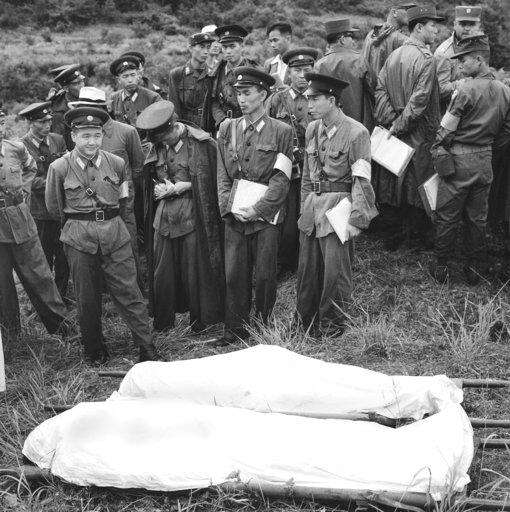In this circa 1987 photo, AP photographer Kim Chon-kil looks at negatives at the Seoul, South Korea bureau. Kim suffered a broken arm when he was caught between rock-throwing students and riot police. Former Associated Press photojournalist Kim, whose images captured South Korea's turbulent transition from dictatorship to democracy, has died. He was 89. Kim's son, Kim Kuchul, confirmed he died in New York on Thursday, Sept. 6, 2018. (AP Photo/Corporate Archives)
The Associated Press
SEOUL, South Korea (AP) - Former Associated Press photojournalist Kim Chonkil, whose images captured South Korea's turbulent transition from dictatorship to democracy, has died. He was 89.
Kim's son, Kim Kuchul, said he died in New York on Thursday after fighting kidney and respiratory problems.
Kim covered South Korea for the AP for nearly 40 years until leaving the company in 1987, a period during which the country rose from the devastation of the 1950-53 Korean War into an Asian industrial power and a full-fledged democracy following a bloody struggle against dictatorship.
Kim will be remembered for one of the most iconic photos in South Korea's history - a May 1961 photo of Gen. Park Chung-hee, in an army cap and sunglasses, observing a march of military cadets in the capital, Seoul, two days after seizing power in a coup.
For most South Koreans, it was the first time they saw the staunch anti-communist dictator who would rule the country for nearly 20 years before being assassinated in 1979. Park left a mixed legacy as a successful economic strategist and a brutal strongman who tortured and executed dissidents.
"He was at the very front line of recording South Korea's contemporary history," Paul Shin, a longtime AP writer, said about his former colleague Kim. "He always tried harder than others to be at the scene. He had a strong sense of responsibility, but was also a very generous person."
Kim was hired by the AP during the Korean War, initially helping American reporters as an interpreter and translator before formally getting a job as a photojournalist. He also covered the fall of South Korea's first president, Syngman Rhee, who fled into exile in Hawaii in 1960 amid nationwide protests over election-rigging suspicions and the 1980 pro-democracy demonstrations in the southern city of Gwangju, where hundreds died in a violent crackdown.
Kim also covered a wave of pro-democracy protests in 1987 that eventually forced the government of Chun Doo-hwan, another army general who took power in a coup weeks after Park's death, to accept free presidential elections.
Kim left the AP later in 1987 and worked as a photo editor for Time magazine during the 1988 Summer Olympics in Seoul. He immigrated to the United States in 1993 and settled in New York.
He is survived by a wife and three children. A funeral is planned in New York.
FILE - In this Oct. 27, 1979, file photo, people walk beside a South Korean army tank after martial law was declared following the death of South Korean President Park Chung-hee in Seoul, South Korea. Former Associated Press photojournalist Kim Chonkil, whose images captured South Korea's turbulent transition from dictatorship to democracy, has died. He was 89. Kim's son, Kim Kuchul, confirmed he died in New York on Thursday, Sept. 6, 2018. (AP Photo/Kim Chonkil, File)
The Associated Press

FILE - In this May 23, 1987, file photo, plainclothes police, left, try to seize anti-government demonstrators as others hold them off during clashes in the center of Seoul, South Korea. Police deployed 15,000 riot police to prevent demonstrations. Former Associated Press photojournalist Kim Chonkil, whose images captured South Korea's turbulent transition from dictatorship to democracy, has died. Kim's son, Kim Kuchul, confirmed he died in New York on Thursday, Sept. 6, 2018. He was 89. (AP Photo/Kim Chon-kil, File)
The Associated Press

FILE - In this Wednesday, March 3, 1961, file photo, thousands participate in a rally as South Korea celebrates the anniversary of its 1919 independence uprising against Japan, with pledges to work toward reunifying the divided peninsula and reconstructing the economy. Former Associated Press photojournalist Kim Chonkil, whose images captured South Korea's turbulent transition from dictatorship to democracy, has died. He was 89. Kim's son, Kim Kuchul, confirmed he died in New York on Thursday, Sept. 6, 2018. (AP Photo/Kim Chonkil, File)
The Associated Press

FILE - In this Aug. 9, 1962 file photo, covered bodies of North Koreans killed in an incident within the demilitarized zone, lie on the ground as a communist North Korean observer team investigates the dispute. The clash occurred when North Korean soldiers fired against a team of South Korean soldiers repairing a road. The South Koreans returned fire and killed three communists. Former Associated Press photojournalist Kim Chonkil, whose images captured South Korea's turbulent transition from dictatorship to democracy, has died. He was 89. Kim's son, Kim Kuchul, confirmed he died in New York on Thursday, Sept. 6, 2018. (AP Photo/Kim Chonkil, File)
The Associated Press

FILE - In this June 16, 1987, file photo, students run away from tear gas as police try to disperse anti-government protesters at Sogang University in Seoul, South Korea, on the seventh day of anti-government demonstrations. Former Associated Press photojournalist Kim Chonkil, whose images captured South Korea's turbulent transition from dictatorship to democracy, has died. He was 89. Kim's son, Kim Kuchul, confirmed he died in New York on Thursday, Sept. 6, 2018. (AP Photo/Kim Chonkil, File)
The Associated Press
FILE - In this Wednesday, March 3, 1961, file photo, an elderly Korean man in traditional clothing poses for a portrait. Former Associated Press photojournalist Kim Chonkil, whose images captured South Korea's turbulent transition from dictatorship to democracy, has died. He was 89. Kim's son, Kim Kuchul, confirmed he died in New York on Thursday, Sept. 6, 2018. (AP Photo/Kim Chonkil, File)
The Associated Press